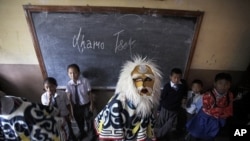While U.S. celebrations of the Dalai Lama's birthday were quite public and high-profile, they were muted for tens of thousands of his followers in Nepal. The government banned assemblies to celebrate the Tibetan spiritual leader's birthday, citing fears of anti-Chinese demonstrations.
Riot police surrounded an elementary school in Nepal's capital Kathmandu Wednesday, where exiled Tibetans were hoping to celebrate the 76th birthday of their spiritual leader, the Dalai Lama.
Tsewang Dolma is the president of the Nepal chapter of the Tibetan Youth Congress.
"Police officers were there from the early morning, 2 o'clock," said Dolma. "We tried to celebrate, but the police didn't allow anyone inside the gate."
Thousands of Tibetan refugees fled over the border into Nepal after a failed 1959 uprising against Chinese rule. More than 20,000 exiles are living in Nepal and others pass through the Himalayan nation on their way to India, where the Dalai Lama lives.
Over the past two years, Nepal has tightened restrictions on gatherings of exiled Tibetans and warned it would permit no public events to celebrate the Dalai Lama's birthday. Authorities say they fear such events would escalate into anti-China demonstrations.
Nepal officially considers Tibet part of China and has vowed to prevent such activities by Tibetan exiles.
Dolma, with the Tibetan Youth Congress, says many Tibetans living in Nepal are frustrated with the country's enforcement of the one-China policy condoned by Beijing.
"Here, the government listens [to] everything, [when] the Chinese government gives them orders," said Dolma. "I can say it's like a second Tibet, in Nepal."
Right up until this year, when he abdicated his formal political role, the Dalai Lama led a government-like administration in the Indian town of Dharamsala that cares for more than 130,000 Tibetans in India and around the world.
The Dalai Lama says he is willing to negotiate autonomy for Tibet under Chinese rule.
"The issue is six million peoples' basic rights, their culture, that's the issue," he said. "So unless the central government pay seriously about that issue, the talks about my return is not relevant."
Beijing accuses him of hiding a separatist agenda, and strictly prohibits displays of his image and other public references to him in its territory.
Tibetan exiles have been on edge for months, since a monk in Chinese-controlled Tibet burned himself to death in protest of harsh rule there. Hundreds of Chinese security forces have since surrounded the young monk's monastery, and many of the monks there have reportedly been taken away for "political re-education" by Chinese officials.




